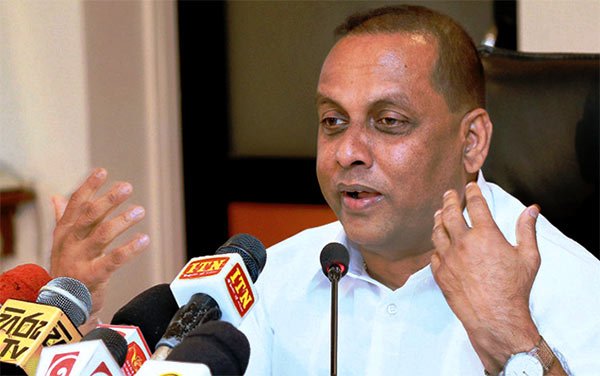Power Minister says no electricity disconnections due to non-payment of bills

Electricity consumers did not have to worry about disconnections due to nonpayment of bills in the current circumstances, Power and Energy Minister Mahinda Amaraweera said, yesterday, adding that he had instructed the senior management of the Ceylon Electricity Board (CEB) not to send red notices.
A CEB official said that either the government or the consumers had to bear the cost as the CEB could not go on without being paid for supplying power.
Sources said Amaraweera had also asked the Board of Management of the CEB to arrange for electricity bills to be paid in installments.
The Minister has said that domestic electricity consumption was on the rise due to lockdowns.
There is no meter reading or billing for electricity consumed in highly populated districts like Colombo, Gampaha, etc.
The CEB normally collects between Rs. 500 and Rs. 600 million on a daily basis and utilises much of it to service its massive debt.
The debt-ridden CEB is further burdened by nearly Rs. 15 billion left uncollected from its customers since the COVID-19 hit the nation.
CEB Chairman Engineer Vijitha Herath told The Island that there wouldn’t be any power disconnections due to nonpayment of electricity bills till further notice, but he believed consumers should do their utmost to pay their bills as its daily collection had fallen to Rs. 100 million.
The CEB, on average, loses Rs. 6.66 on each kWh produced, engineers say. The average selling price is Rs. 16.53, and CEB subsidies amount to nearly Rs. 90 billion annually.
A senior engineer said that subsidy breakdown was as follows: the Lanka Electricity Company (LECO) Rs. 11,661 million, Domestic (LOW END) Rs. 39,792 million, religious places Rs. 1,152 million, government Rs. 847 million, industrial Rs. 30,947 million, hotels Rs. 1,192 million, street lights Rs. 1,885 million and general purpose Rs. 34 million.
The CEB requests consumers not to wait for an accumulated electricity bill for two months in May, and to pay the value of the previous month’s bill during April.
(Source: The Island – By Ifham Nizam)
Latest Headlines in Sri Lanka
- Sri Lanka crosses $1 Billion FDI mark in 2025, signals strong investment recovery January 26, 2026
- STF arrests key underworld drug operative with Rs. 30 Million ICE haul in Bambalapitiya January 26, 2026
- GMOA launches island wide trade union action warning of health service collapse January 26, 2026
- IFC announces $166 million financing package to support Sri Lankan businesses January 25, 2026
- Rs. 133.94 Million worth of Kush and Hashish smuggling attempt foiled at BIA January 25, 2026



he should have post offices and supermarkets opened for payments of bills and he should have electricity from least cost BOT coal fueled projects as base load and economical hydro with large reservoirs as peaking power and he should not have any other power connected to our grid he should get curfew remove such that a casual labor who earns 500 Rs. a day can contribute to our economy so are buss drivers and buss conductors
Wow, easy man…can you please be more coherent?…your ranting here makes sense to me as much as what I heard last night from a drunkard sailor!